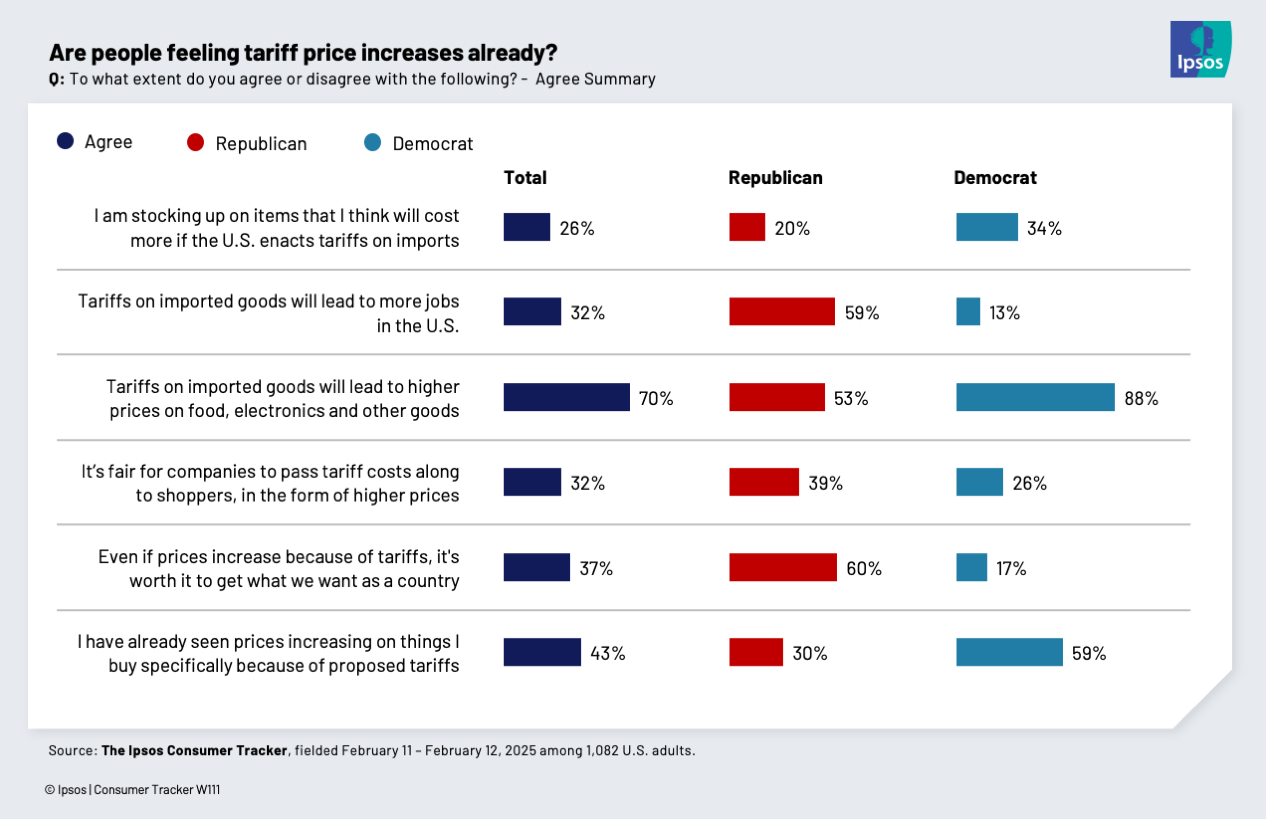Are people feeling tariff price increases already?
The Ipsos Consumer Tracker asks Americans questions about culture, the economy and the forces that shape our lives. Here's one thing we learned this week.
Why we asked: President Trump has imposed and quickly revoked tariffs on several nations including allies like Canada and Mexico. However, the 10% tariff on Chinese imports stuck, exceptions to existing tariffs on steel and aluminum have been revoked, and he continues to propose new tariffs on various industries and trading partners.
What we found: For the most part, our opinions haven’t shifted too much since we first started asking about tariffs in December. About one in four are stocking up on goods (electronics led that according to our last wave).
An increasingly large majority (now 70%) believe that tariffs will raise prices on the goods they buy. But only one in three think it’s fair for companies to pass along the cost of tariffs in the form of higher prices. That’s a tension worth watching in a number of ways. One is the consumer side and how much people will push back on price hikes, especially as inflation stubbornly persists. The administration is already “softening its tone” on how quickly prices will come down.
(See also: our take on the Trump administration’s potential impacts on business)
Speaking of, about four in ten say that they are already seeing prices increase, but it’s worth noting two things. One, inflation is still a thing and prices on things like eggs are spiking due to bird flu, not tariffs. Two, Democrats are twice as likely to say that (60% to 30%), so there might be some bias there, although younger people are saying that, too.
Another side is how businesses large and small will react as the new tariffs (and potentially a raft of additional ones) take effect. Will they raise prices, or try to cut costs and margins instead? One example comes from Dearborn Denim, a small U.S. apparel manufacturer profiled in What the Future’s Manufacturing issue. When the tariffs on Mexico (where the company sources some of its denim) were announced, they sent a memo to customers that they would try to offset the tariffs with higher volume as long as they could, “I plan to keep our current pricing on all denim, eating the tariff as long as we can on the imported fabrics,” wrote CEO Rob McMillan. “Material costs are up, labor costs are up, but Dearborn Denim is selling more jeans. The higher volume reduces our overhead expense per jean.” How this dance proceeds between margins and costs and consumer reaction to them is volatile, and a good reason to stay close to your customers.
About four in ten (37%) also say that price increases are worth it to get what we want as a nation. That has a party split the other way, with 60% of Republicans agreeing, compared to just 17% of Democrats. That could easily be related to being more in agreement with “what we want as a nation.” There wasn’t really a split of household income, however.
There’s also a slight increase in people thinking that more jobs will be created, which is one more side of the coin. Could there be a great reshoring of American-made goods (using American raw materials, too)? Perhaps.

More insights from this wave of the Ipsos Consumer Tracker:
The only ID that matters is Party ID
'Buying American' remains popular, but Democratic support wavers
Most did what they told us they would when it came to watching the Super Bowl
The Ipsos Care-o-Meter: What does America know about vs. what does America care about


